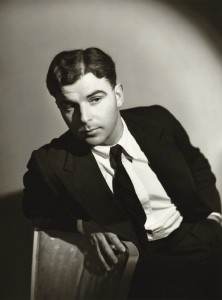
by Gordon Anthony, bromide print, 1938
Emlyn Williams was born on November 5, 1905 into a Welsh-speaking, working-class family in Glan-yr-afon, Mostyn, Flintshire. When he was 11 he won a scholarship to Holywell Grammar School and went on to study at Christ Church, Oxford, where he read French and Italian and joined the Oxford University Dramatic Society. Theatre soon became his life. His first full-length play, Full Moon, premiered at the Oxford Playhouse in 1927, the same year he joined a repertory company there. By 1930, he had expanded his writing with works such as A Murder Has Been Arranged and an English version of Sidney Howard’s play The Late Christopher Bean (TACT 2009), both of which proved successful. He became internationally famous, however, with his thriller Night Must Fall (1935), in which he also played the lead role of a psychopathic murderer.
His other greatest play, The Corn Is Green, however, has a very different character. Based largely on his own childhood in Wales, the play depicts how a young man (Morgan Evans) escapes the short and dangerous life of a coal miner in Wales for an Oxford education and a life beyond the narrow reaches of the coalfields. Williams’ own destiny was turned around with the help of a most singular and determined teacher named Miss Sarah Grace Cooke, a social worker from London who, like Miss Moffat, as the teacher is called in the play, had set up a school in his part of Wales.
The Corn Is Green premiered in London in 1938 and won raves for Sybil Thorndike, with whom Williams co-starred as Morgan Evans. The Broadway Premiere in 1940 featured Ethel Barrymore who also toured with the show. Eva Le Gallienne played the role in NY in 1950 and Cecily Tyson was Miss Moffat in a short-lived 1983 Broadway revival. The 1945 film of The Corn is Green starred a 37 year old Bette Davis as Miss Moffat and the 1979 TV movie, directed by William’s close friend, George Cukor, featured a 72 year old Katharine Hepburn.
Miss Moffat became one of the great female roles in English Theatre of the mid-twentieth Century. She is a powerful and determined career woman who overcomes social and economic obstacles in a rough land against strong odds. It is a presciently feminist role and one that still has great resonance today. It is not surprising that the role attracted some of the most celebrated actresses of the time.
Also resonant today is the debate over coal mining both in Wales and in this country. Both mechanization and environmental concerns have displaced many coal miners. There has been slow progress in re-education and re-training for other skilled jobs. The hope of a better life offered by Miss Moffat to young Morgan Evans is surely a common and oft-repeated wish for many even today.
In addition to stage his plays, Williams wrote a number of screenplays, working with Alfred Hitchcock (on The Man Who Knew Too Much), Carol Reed, and other directors. Other screen credits include Hitchcock’s adaptation of Daphne du Maurier’s Jamaica Inn (with Charles Laughton), and Gabriel Pascal’s film version of George Bernard Shaw’s Major Barbara (with Wendy Hiller and Rex Harrison, in which Williams also played the role of “Snobby Price”). He also wrote, directed and starred in The Last Days of Dolwyn (1949), which is also notable for the screen debut of his fellow Welshman and friend, Richard Burton.
Williams often appeared in his own plays, and was particularly famous for his one-man-shows, with which he toured the world. The first was Emlyn Williams as Charles Dickens, an evening of excerpts from Dickens’ novels. He followed this up with one man shows based on the works of Dylan Thomas (Dylan Thomas Growing Up), and writer H.H. Munro – better known under his pseudonym “Saki” – The Playboy of the Week-End World.
Williams was married in 1935 to actress Mary Marjorie O’Shann (Molly Shan), who died in 1970. They had two sons, Alan, a writer, and Brook, an actor. He was appointed a Commander of the Order of the British Empire (CBE) in 1962 and died on September 25, 1987 at his flat in Dovehouse Street, London at the age of 81, due to complications from cancer.
Williams wrote a highly successful two volume autobiography, George (1961) and Emlyn (1973). The books are particularly notable for Williams’ frank and open discussion of his bisexuality, making him one of the first publicly “out” literary figures, well before other better-known celebrities such as his close friend and contemporary Christopher Isherwood.